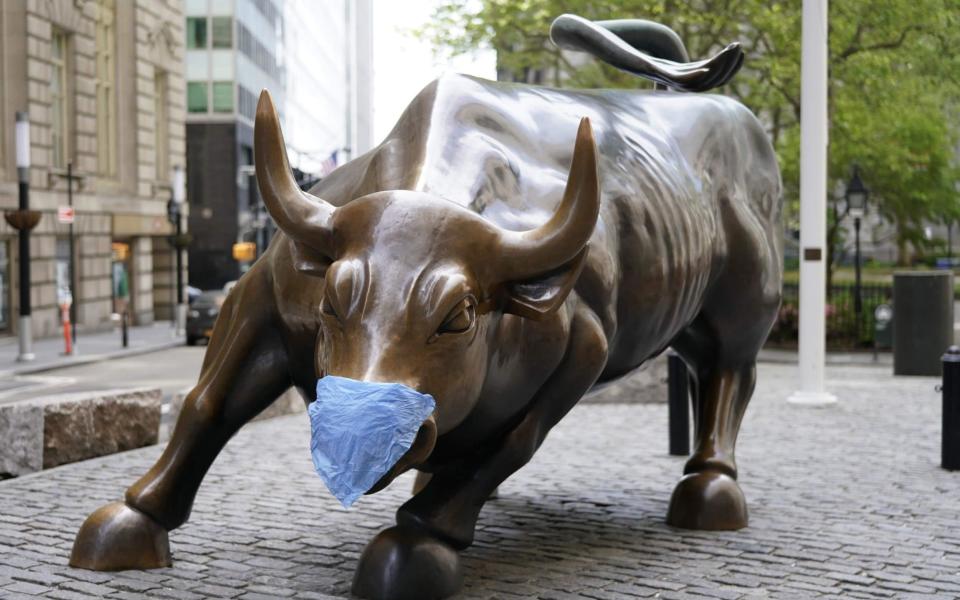Fund that called the last two crashes starts to short global stock markets

The apostles of "value investing" have called the top of the Covid-19 equity rally.
The closely watched GMO fund has been liquidating its holdings on US and European stock markets and buying hedges at a breakneck pace over recent days, warning clients that the explosive surge in prices since late March has decoupled from fundamentals and is becoming treacherous. “The huge reversal does not make any sense,” it said.
The group’s main fund has turned short, taking large negative positions on equity indexes through futures contracts. “It is going to be very difficult to come out of this pandemic unscathed. We have a pretty strong view that with so much extreme uncertainty, equities should be cheap. Quite simply they are not,” said Tommy Garvey, GMO’s asset strategist.
“We think the long-term return on US equities is going to be negative and prices will have to drop even below the March lows to be attractive,” he said. This implies a 30pc fall in the S&P 500 index to clear the froth and restore plausible valuations.
Mr Garvey said emerging market equities are closer to fair value with dividend yields near 6.5pc. Much of East Asia has overcome the sudden stop from Covid-19 without suffering deep economic damage, thanks to testing and tracking regimes that have put the West to shame. Emerging markets are the only area in the world where GMO still has a net long position.
The group forecasts an average annual real loss of 3.6pc on large US companies over the next seven years, as well as grueling attrition for US and European bonds. It thinks value stocks in developing countries promise annual gains of 10pc (share appreciation and dividends together).
The GMO fund, co- founded by British investor Jeremy Grantham, champions the lost art of disciplined investing, much like Warren Buffett’s Berkshire Hathaway. It delves into corporate entrails - book worth, profit margins, and so forth - to identify unloved shares with intrinsic worth. Over time these stocks tend to come back into favour under the iron law of ‘mean reversion’.
Mr Grantham rose to stardom with alarm calls before the dotcom bust in 2000 and the Lehman crisis in 2008 but has had a rougher time navigating the QE era. Central banks have distorted market signals and played havoc with the concept of equity value.

The post-Covid blitz by the US Federal Reserve - which has increased its balance sheet from $4 trillion to $7 trillion in just two months - has flooded the system with liquidity, in concert with emergency spending by the US Treasury. This may have masked a lot of sins and played havoc with normal price-to-earnings ratios.
The Fed has torn up the rule book and is buying the debt of "fallen angels" - BBB companies reduced to junk status. It could at any time go further and start to buy equity index funds and exchange-traded funds as well. The Bank of Japan is already doing so.
But the GMO philosophy is that liquidity is mostly short-term market noise. In the end, central banks cannot stop fundamentally insolvent companies from going bankrupt. The bigger the debt-bubble, the greater the ultimate damage.
“We are not afraid of being contrarian, but frankly there are a lot of other people expressing concern about the markets,” said Mr Garvey.
Among them is the hedge fund veteran Stanley Druckenmiller, the partner of George Soros in his assault on the Exchange Rate Mechanism in 1992. He told the Economic Club of New York this month that Wall Street had misread the damage from the pandemic and lost its moorings: “The risk-reward for equity is maybe as bad as I’ve seen it in my career.”
Mark Ostwald from ADM said corporations have issued $540bn of dollar debt in the last two months alone to weather the economic crisis. While zero-rates mean that the money is "free" in one sense, the loans still have to be repaid.
The sheer volume of debt has reached such levels that the repayment of principle - now a bigger issue than interest costs - has its own remorseless economic logic. “This is going to suck the life out of economic growth,” he said.
Nor is the flow of monetary stimulus continuing at the same torrid pace as in March and April. “Markets have not yet cottoned onto the deteriorating flows. I am afraid that there is going to be a lightbulb moment,” he said.

 Yahoo Finance
Yahoo Finance 